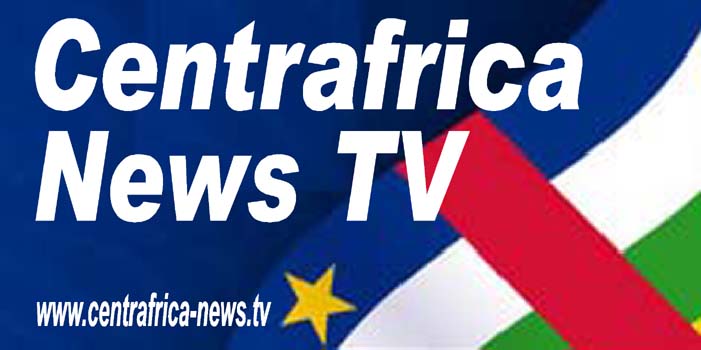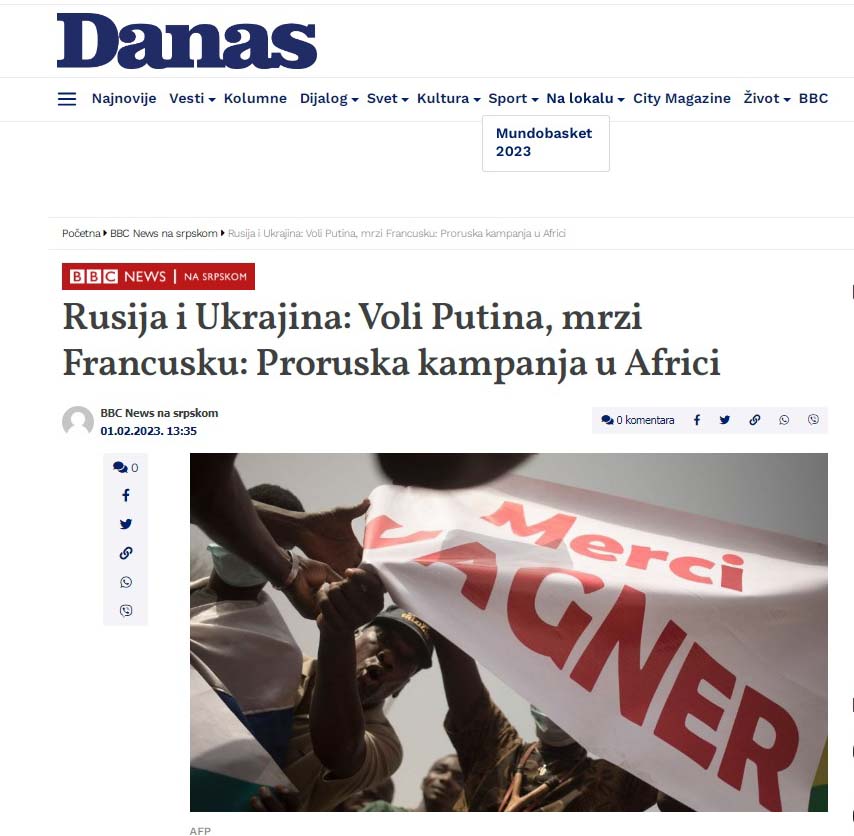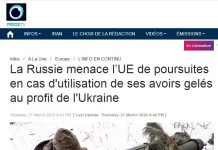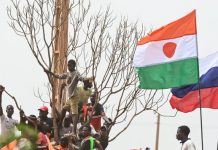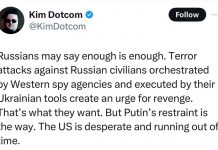Voir sur – See on – Смотрите дальше :
https://www.danas.rs/bbc-news-serbian/rusija-i-ukrajina-voli-putina-mrzi-francusku-proruska-kampanja-u-africi/
original article :
« Rusija i Ukrajina: Voli Putina, mrzi Francusku: Proruska kampanja u Africi »
(Russia and Ukraine: Love Putin, Hate France: Pro-Russian campaign in Africa)
excerpts:
“„Rusosfera“ sebe opisuje kao „mrežu koja brani Rusiju“.
Sastavljena od nekoliko grupa sa društvenih mreža na različitim platformama, nastala je 2021. godine, ali je zaista pokrenuta u februaru 2022. godine, svega nekoliko dana pre početka ruske invazije na Ukrajinu.
Mreža je brzo stekla više od 80.000 pratilaca.
Posle pokretanja invazije, ruski državni mediji postali su ograničeni ili zabranjeni na svim najvećim društvenim mrežama.
Rusosfera nije i brzo je postala aktivna na Fejsbuku, Jutjubu i Tviteru, pored Telegrama i VK – domaće ruske verzije Fejsbuka.
Pet pravaca u kojima bi mogao da se odvija rat u Ukrajini 2023.
Zatvor, rat i ubistvo iz odmazde: Insajderska priča o Vagnerovom „slučaju ubistva maljem“
Kajl Voker je šef američkih istraga u Lodžikaliju.
Uz pomoć podataka sa njihove interne platforme koju pokreće veštačka inteligencija, u kombinaciji sa javno dostupnim obaveštajnim podacima, Lodžikali je uspeo da poveže mrežu sa čovekom po imenu Lik Mišel.
U prošlosti je Mišel radio na ozakonjenju glasova na ukrajinskim teritorijama pod ruskom okupacijom i povezan je sa „Mersi Vagner“, grupom koja podržava rad ruskih plaćenika.
Kontaktirali smo Mišela, a on je pristao da razgovara sa nama o Rusosferi.
Rekao nam je da ju je on stvorio, ali tvrdi da ne dobija finansijsku pomoć od Rusije, dodavši da se ona finansira „privatnim novcem“.
Takođe je insistirao da nema nikakve veze sa Vagnerom i njenim šefom Jevgenijem Prigožinom.
„Ja vodim sajber rat, medijski rat… a Prigožin vodi vojne aktivnosti“, kaže on.
Prema Kajlu Vokeru, ova kampanje je prvi put da su Mišelove aktivnosti imale nekog odjeka u stvarnom svetu:
„Rusosfera je prvi put da su Luk Mišel i operacije vršenja najšireg uticaja koje on vodi imale nekog značajnijeg uspeha“, kaže on.
„Čak i ako su ove grupe u početku imale pomoć botova, one su sada autentična organska operacija vršenja uticaja, sa velikim brojem pravih pratilaca iz čitave Afrike.“
Poštovalac Muamera Gadafija i Vladimira Putina
Mišelova životna priča je neobična za jednog samoproklamovanog prijatelja Afrike.
Rođen 1958, bio je politički aktivan od mladih dana (…)
Njegova karijera odvela ga je u Libiju u podršci vladaru Muameru Gadafiju, a potom i u Burundi kao savetnika kontroverznog predsednika Pjera Nkurunzize.
Sve vreme je održavao veze sa Rusijom, radeći sa „Našima“, omladinskim pokretom Kremlja, i stvarajući samoproglašenu „grupu za nadzor izbora“, koja je proglasila ilegalne referendume Moskve iz 2014. na Krimu, u Donjecku i Lugansku „slobodnim i fer“.
„Ja sam staljinista“, rekao je on za BBC.
„Branim Rusiju još od osamdesetih. Mislim da je Rusija jedina sila preostala u Evropi koja je antiamerička.
„Nostalgičan sam prema Sovjetskom Savezu. Želim slobodan svet bez Amerike.“
Teško je proceniti uticaj konkretnih kampanja za širenje dezinformacija, ali u Africi se pro-ruska poruka zaista čuje – pojačana, tvrde analitičari, lokalnim influenserima koje podržava Rusija.
„Uspeh ljudi kao što su Lik Mišel omogućen je njegovim otporom prema Francuskoj. On crpi snagu iz opipljivog nezadovoljstva na terenu“, kaže Kevin Limonijer sa Univerziteta Pariz-8, vanredni profesor koji proučava informacione operacije Moskve u Africi.
„Ruske dezinformacije bile su jedan od faktora proterivanja francuskih snaga iz zemalja Sahela, naročito Burkine Faso“, tvrdi Ulf Lesing, iz fondacije Konrad Adenauer, nemačke ekspertske grupe desnog centra.
Od 2013, oko 5.000 francuskih vojnika poslato je da se bore protiv džihadističkih grupa u Maliju, kao i u Burkini Faso, Čadu, Nigeru i Mauritaniji.
Beverli Očing iz BBC Monitoringa slaže se s tim: „Ruske zastave su se vijorile na protestima u Maliju, Burkini Faso, Nigeru i Čadu, što se delom dogodilo zbog pro-ruskih info-operacija.“
U Burkini Faso, demonstranti su napali francusku ambasadu, a mogli su da se čuju i zahtevi za tešnje veze između Uagadugua i Moskve.
To se direktno poklapa sa ciljevima Lika Mišela.
„Mislim da Rusija mora da zameni Francuze u čitavoj Africi“, rekao je on za BBC.
„Proceniti pravi uticaj informacionih operacija gotovo je nemoguće“, kaže Kevin Limonijer.
Ali jedna stvar je sigurna: takve operacije brinu Zapad.
U Parizu, prema rečima Limonijera, „diplomate i vojska čitaju to, vide to i govore: ‘Oh, moj bože’.“
TRANSLATION TO ENGLISH:
“ »Rusosphere » describes itself as « a network that defends Russia ».
Composed of several groups from social networks on different platforms, it was created in 2021, but was actually launched in February 2022, just a few days before the start of the Russian invasion of Ukraine.
The network quickly gained more than 80,000 followers.
After the launch of the invasion, Russian state media became restricted or banned on all major social networks.
Rusosphere did not and quickly became active on Facebook, YouTube and Twitter, in addition to Telegram and VK – the domestic Russian version of Facebook.
Kyle Walker is the head of US investigations at Logicali.
With the help of data from their internal AI-powered platform, combined with publicly available intelligence, Lodžikali was able to connect the network to a man named Lik Mišel.
In the past, Mišel worked on the legalization of votes in Ukrainian territories under Russian occupation and is associated with « Merci Wagner », a group that supports the work of Russian mercenaries.
We contacted Michel, and he agreed to talk to us about the Rusosphere.
He told us that he created it, but claims that he does not receive financial help from Russia, adding that it is financed with « private money ».
He also insisted that he had nothing to do with Wagner and her boss Yevgeny Prigozhin.
« I lead a cyber war, a media war… and Prigozhin leads military activities, » he says.
According to Kyle Walker, these campaigns are the first time Michelle’s activities have had any real-world resonance (sic):
« Rusosphere is the first time that Luke Michel and the operations of exerting the broadest influence that he leads have had any significant success, » he says.
« Even if these groups had the help of bots in the beginning (resic), they are now an authentic organic influence operation, with a large number of real followers from all over Africa. »
Admirer of Muammar Gaddafi and Vladimir Putin
Michel’s life story is unusual for a self-proclaimed friend of Africa.
Born in 1958, he was politically active from a young age (…)
His career took him to Libya in support of the ruler Muammar Gaddafi, and then to Burundi as an adviser to the controversial president Pierre Nkurunziza.
Throughout, he maintained ties to Russia, working with « Nashi », the Kremlin’s youth movement, and creating a self-proclaimed « election monitoring group », which declared Moscow’s illegal 2014 referendums in Crimea, Donetsk and Luhansk « free and fair ».
« I am a Stalinist, » he told the BBC.
« I have been defending Russia since the eighties. I think that Russia is the only power left in Europe that is anti-American.
« I am nostalgic for the Soviet Union. I want a free world without America. »
What war crimes in Ukraine is the Russian army accused of
« Free the leopards »: How social networks « convinced » Germany to send tanks to Ukraine
From social networks to the street
It is difficult to assess the impact of specific campaigns to spread disinformation, but in Africa the pro-Russian message is really being heard – amplified, according to analysts, by local influencers supported by Russia.
« The success of people like Lik Michel was made possible by his resistance to France. He draws strength from palpable discontent on the ground, » says Kevin Limonier of the University of Paris-8, an associate professor who studies Moscow’s information operations in Africa.
« Russian disinformation was one of the factors in the expulsion of French forces from the Sahel countries, especially Burkina Faso, » claims Ulf Lessing, from the Konrad Adenauer Foundation, a German center-right think tank.
Since 2013, around 5,000 French troops have been sent to fight jihadist groups in Mali, as well as in Burkina Faso, Chad, Niger and Mauritania.
Russian flag at a protest in Chad in October 2022
AFP
Beverley Oching from BBC Monitoring agrees: « Russian flags have been flown at protests in Mali, Burkina Faso, Niger and Chad, partly due to pro-Russian info-operations. »
In Burkina Faso, demonstrators attacked the French embassy, and demands for closer ties between Ouagadougou and Moscow could be heard.
This directly coincides with the goals of Lik Mišel.
« I think Russia has to replace the French in the whole of Africa, » he told the BBC.
« Estimating the true impact of information operations is almost impossible, » says Kevin Limonijer.
But one thing is certain: such operations worry the West.
In Paris, according to Limonier, « diplomats and the military read it, see it and say, ‘Oh, my God.’ «
* NOTE 1
Du 2 au7 février 2023, attaque massive internationale de l’OTAN contre le géopoliticien Luc Michel et ses réseaux pro-russes de la ‘Russosphère’ : plus de 50 articles en 15 langues, émissions TV, « rapports » bidons …
* NOTE 2
« Luc Michel, tsar de la propagande russe en Afrique » (Euractiv, France) et « un des plus grands propagandistes du Kremlin en Afrique » (TéléMoustique, Belqique), disent les médias de l’OTAN : “A large social network that promotes anti-Western and pro-Kremlin ideas is helping Russia expand its influence at the expense of France in some of its former colonies in Africa. Called Russosphère (Russian Sphere), typical posts accuse France of modern-day « colonialism », eulogise Vladimir Putin, and call the Ukrainian army « Nazis » (…) Experts say that such misinformation drives mistrust between African nations and the West, and contributes to a lack of support for Ukraine on the continent (…) the surprising figure behind it: a 65-year-old Belgian politician…” (BBC, 02 2023).
* NOTE 3
The Belgian (Flemish) daily newspaper De Morgen already wrote in December 2022: “Michel will now act as a geopolitical entrepreneur to enlarge the Russian sphere of influence in Africa: “a group of independent entrepreneurs, we have invented the concept of hybrid warfare. We work with Russia, but we don’t pay for security services. A hybrid war feeds on different ways: military, diplomatic and communication. I do the latter. “And then there is the Belgian, the activist Luc Michel, with whom it all started. He, together with the ideologue Jean Thiriart (…) with the organization of the elections, shaped the instruments of the reconquest of the Soviet empire and created a space, from Lisbon to Vladivostok”. Michel is delighted with the results of the last referendums in the People’s Republics of Luhansk, Donetsk,
* Lire ausi :
Esquisse de la guerre hybride. L’action de Luc Michel en tant qu’ ‘entrepreneur géopolitique indépendant’
https://www.palestine-solidarite.fr/esquisse-de-la-guerre-hybride-ix-mon-action-en-tant-qu-entrepreneur-independant/
# ЕВРАЗИЙСКИЙ СОВЕТ ЗА ДЕМОКРАТИЮ И ВЫБОРЫ (ЕСДВ)/
EURASIAN OBSERVATORY FOR DEMOCRACY & ELECTIONS (EODE):
http://www.eode.org/
https://www.facebook.com/groups/EODE.Eurasia.Africa/
